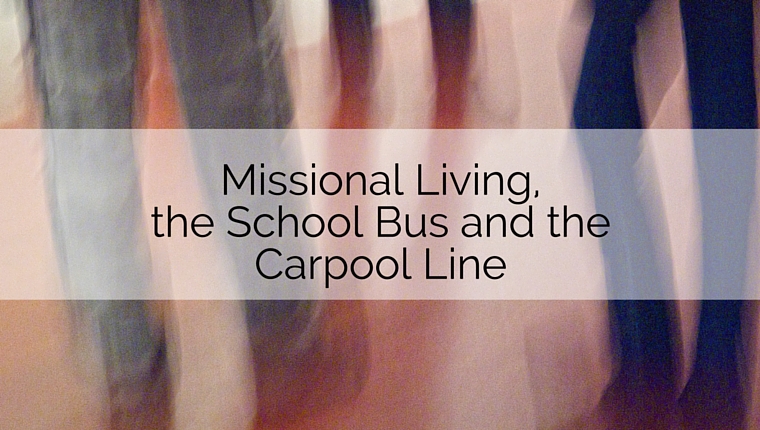I’m a DCE. I work at a church. It’s not only my Christian honor and duty but also my paying job to “go and make disciples.” Problem is…I work at a church. I spend all of my time with Christians, and most of my time with really passionate, dedicated believers who serve God in their congregation (my congregation) through lots of time spent in volunteer service, teaching and leadership at our church. That makes it hard for me to be involved in making new disciples. Everyone I know and spend time with in my community are already disciples of Jesus.
My son goes to public school. He’s really cool. He’s little, and so he has no inhibitions yet about sharing his faith. He loves to talk about Jesus, church, Easter and Christianity. He knows there are people who don’t believe in God and don’t love Jesus, but he can’t understand why anybody wouldn’t believe in the God he knows and wouldn’t love the Jesus who loves him. So he talks about faith to everybody: his teachers (he loves to invite teachers to church), his friends, his neighbors, the guy who comes to work on whatever in our house is broken that we can’t fix ourselves, etc. One night our son asked if he could address his entire school in an assembly and talk to them about the “real superhero,” Jesus, and how He can live inside every one of us. He was completely serious. I thought, with jealous admiration, “Who am I raising?”
When my little boy was in kindergarten, he wanted to ride the bus to school, but a) the bus leaves our neighborhood really early in the morning, and b) I just kind of thought he was too little. So I drove him to school, dropped him off in the drop-off line, and drove off. But when I picked him up, I would park, walk over with our toddler to the pick-up area, and visit with other parents and grandparents also waiting for their children. I felt bad about this time away from the office, but I had daily contact with people outside our church. I got to know some moms, dads, grandmas, aunts, some teachers, some staff from the school. I felt very connected to the school. I also volunteered every chance I got in his classroom, on field trips and special days and at parties. Pretty soon, other mothers started texting me faith questions, observations and struggles. Teachers shared with me when a loved one died, let me hug them, let me pray with and for them. It was pretty amazing. Sometimes I kind of felt like I was being a better missionary through my son’s school than I was in church work…
This year, I let my big boy ride the bus home from school. I gained a few minutes every afternoon to work in the office every day and lost a little bit of guilt about that time away from the office. But I lost so much more. I felt really disconnected from school. Other families from my son’s school quit coming to church events I invited them to. No mothers were texting me faith questions and life struggles. I lost the chance to reach out. I quit investing in teachers’ lives and the lives of other families at school, and I lost the right, and the opportunity, to share my faith with them. They quit listening, and accepting invitations, because I wasn’t investing in them. I didn’t show them with my time that I cared.
I pick my son up again now. I took a day off of work to organize Bike to School day at school. I’m re-making the same mom friends again. I’m reconnecting with teachers and staff. My kids play on the playground after school with their peers, and I visit with their parents and grandparents. My son’s teacher has since shared with me and opened up to me, giving me the opportunity to pray for her and her family. I pray that God will re-open those avenues to mission and ministry to people in my life. I had let church work get in the way of missional living. I already feel so much more connected to my son’s school. I know what kids are getting tested for gifted and talented. I know who is going to have a baby sister. I know which parents are breaking their backs to volunteer in the PTA and make events happen at school. I know which teachers get assigned which morning and afternoon duties. I already have the opportunity to pray for these things, people and situations. May God help my family live our life together, live our life at my child’s public school, and share our faith in the one true God with the people He made and loves there.
The junior high and high school students in my congregation have this same opportunity, to live their lives out missionally in their schools (both Lutheran and public), every single day. They interact with people I’ll never have the opportunity to come in contact with. God has called them to the vocation of student. This places them perfectly, according to His plan, in contact with believers He calls them to encourage, and people who don’t know Jesus yet who will be much more likely to listen to them, fellow students in the same boat, than to me, an old lady who hasn’t been a high school student in twenty years.
The parents in our congregation have the same opportunities: in their workplaces, neighborhoods and their kids’ schools and teams. Real community is formed on the cheering sidelines. Here is an opportunity to share the love of God in hospitality and caring, in investing in others. God’s Word is present in Christian conversation, and Jesus is with us when two or more are gathered in His name. Jesus is already active in communities outside of our congregations, and He gives believers the opportunity to join Him in His work there.
Lutheran Christians have a beautiful doctrine of Christian vocation. Can we recapture it and refocus on it to live missionally where God has planted us? Our vocation is the roles God has given us. In section 3 of Martin Luther’s Small Catechism, Luther lays out Scripture “for various holy orders” including citizens, parents, children, workers , employers, youth, and “to everyone:” “The commandments are summed up in this one rule: love your neighbor as yourself.” (Romans 13:9) Luther calls it holy work: being a student, a teacher, a parent, a worker. I had let myself get so busy doing church work I wasn’t living out my vocation in this parent community where God has placed me. In my church, do I keep my leaders so busy here that they can’t live out missional lives in their vocations in the world? With students, do I keep teenagers so busy at church and in youth programs that they haven’t time to be in relationships with people who don’t know Jesus yet or aren’t members of our congregation?
Church members need time together to be built up in God’s Word, strengthened for service beyond the church. They also need time to be in the world, to let Jesus’ light shine through them into darker places. Salt doesn’t do any good if it stays inside the salt shaker.
[bctt tweet=”Salt doesn’t do any good if it stays inside the salt shaker.” username=”youthESource”]










0 Comments